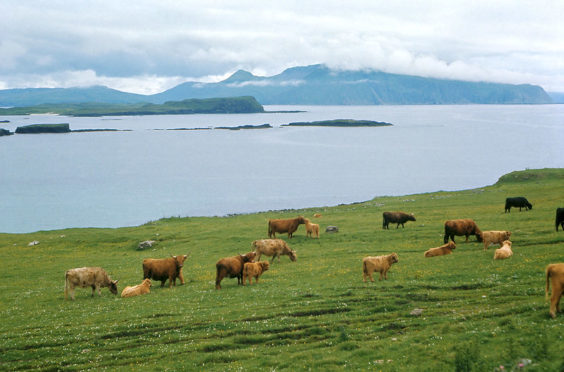A proposal to install the largest fish farm cages in the UK off Canna “is probably the worst location that could have been chosen,” according to the charity which owns the tiny isle.
Mowi, the world’s largest salmon producer, has revealed plans for eight fish farm cages to produce thousands of tonnes of organic salmon in one of the most environmentally protected areas of sea in Britain.
However, conservation charity the National Trust for Scotland has submitted a letter of protest, arguing that the proposed fish farm is located within the biologically richest part of the Small Isles Marine Protected Area.
The cages would be 524ft in circumference and the eight pens would cover more than twice the size of a football pitch.
While the area is home to a variety of marine life, particular attention has been drawn to two extremely rare invertebrates, the burrowing anemone and the Fan Mussel.
The farm would have a maximum biomass of 2,500t of salmon which can be expected to discharge annually the same amount of waste as a town of 33,000 people.
The population of Oban is 8,500 in the winter, rising to about 25,000 in the summer.
NTS fears that all of the waste could have a devastating impact on the seabed.
Strong objections have been raised following a scoping document submitted by Mowi to the Highland Council. NTS has concluded that there are “deficiencies” in the information provided.
Fears over the potential of rats being reintroduced to Canna by associated shipping, thereby threatening important seabird populations, have also been highlighted.
Indeed, such is the proximity of a protected seal haul-out site to Mowi’s proposed site that they would potentially have to shoot seals to protect their stock.
Scottish Natural Heritage has also warned of potential “significant effects” on birds and marine life.
NTS head of conservation and policy, Stuart Brooks said: “The protection of the cultural and natural heritage of Canna on behalf of the nation is our responsibility.
“Based on the information provided by MOWI so far about their fish farm proposals, we have no confidence that their plans would not undermine, if not destroy, the very things that make Canna so important.”
Richard Luxmoore, the trust’s senior conservation adviser said: “Two parliamentary committees have concluded that the environmental impact of fish farms is unacceptable and recommended no further expansion until better controls are in place.”
A spokesman for MOWI said: “We are disappointed to see the NTS publicly campaign so early in this scoping process.
“Our science experts will continue to work with the Canna Development Trust to explore the potential for a sustainable aquaculture development, and look forward to discussing scientific evidence that is the basis for Canna’s decision whether to proceed.”
